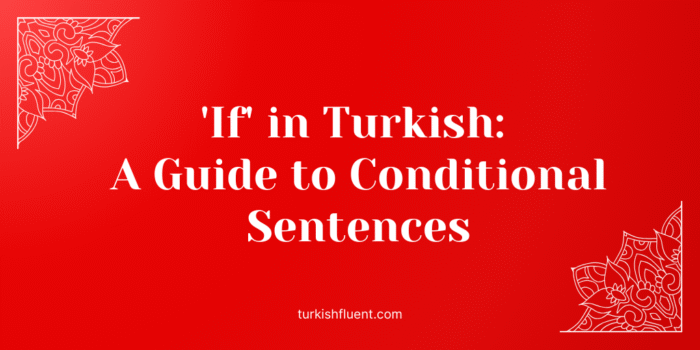Conditional sentences in Turkish express hypothetical situations and their possible outcomes. They typically utilize the conditional suffix -se/-sa and can also include “eğer” (“if”). We explain how to form hypothesis and the different cases in this article.
Forming the Conditional With Suffix -se/-sa
The Turkish conditional form is created by adding -se/-sa directly to verbs, nouns, or adjectives. The vowel harmony rules determine whether you use -se or -sa:
| Last vowel | Conditional Suffix |
|---|---|
| e, i, ö, ü | -se |
| a, ı, o, u | -sa |
Verbs
Attach -se/-sa directly to the verb stem followed by personal endings:
| Verb (Infinitive) | Stem | Conditional Form (3rd person singular) | Translation |
| gelmek | gel- | gelse | if he/she comes |
| yapmak | yap- | yapsa | if he/she does |
| görmek | gör- | görse | if he/she sees |
Examples:
- Bugün erken gelsem, filmi kaçırmam. (If I come early today, I won’t miss the movie.)
- Zamanın varsa, bana yardım etsen iyi olur. (If you have time, it would be good if you help me.)
Nouns & Adjectives
To form conditionals with nouns and adjectives, the suffix -se/-sa is also added directly:
| Word | Conditional Form | Translation |
| hasta (adj.) | hastaysa | if he/she is sick |
| doktor (n.) | doktorsa | if he/she is a doctor |
Examples:
- Hava güzelse, dışarı çıkarız. (If the weather is nice, we will go outside.)
- O öğrenciyse, ücretsiz giriş yapabilir. (If he/she is a student, entry is free.)
Negative Conditional Sentences
For negative forms, attach the suffix to the negative form of the verb (-ma/-me):
| Verb | Negative Conditional Form | Translation |
| gelmek | gelmese | if he/she doesn’t come |
| anlamak | anlamasa | if he/she doesn’t understand |
Examples:
- Sen gelmezsen, ben giderim. (If you don’t come, I will go.)
- Bu kitabı okumazsan, anlayamazsın. (If you don’t read this book, you won’t understand.)
‘If’ with ‘değil’ and ‘var/yok’
When expressing conditional sentences involving negation or existence using değil, var, or yok, attach -se/-sa directly to these words:
| Word | Conditional Form | Translation |
| değil | değilse | if he/she/it is not |
| var | varsa | if there is |
| yok | yoksa | if there is not / otherwise |
Examples:
- O mutlu değilse, yardımcı olmalıyız. (If he/she isn’t happy, we should help.)
- Yeterli zamanımız varsa, kahve içelim. (If we have enough time, let’s have coffee.)
- Soru yoksa, devam edebiliriz. (If there are no questions, we can continue.)
Usage of “Eğer”
The word eğer means “if” and is optionally used at the beginning of conditional sentences to emphasize the conditional meaning. Although it enhances clarity, its use is not mandatory since the suffix -se/-sa alone already indicates conditionality.
Including “eğer” often strengthens emphasis or makes your conditional statement clearer, especially in longer or more formal sentences.
Examples with “eğer”:
- Eğer hava güzelse, pikniğe gideriz. (If the weather is nice, we’ll go for a picnic.)
- Eğer beni dinlemezsen, hata yaparsın. (If you don’t listen to me, you’ll make a mistake.)
With these guidelines, forming conditional sentences in Turkish won’t be a problem for you! Try to practice by adding conditional statements in your daily conversations. To go further, learn how to express necessity in Turkish with “gerek” and “lazım”.

I love how you explain things. Thank you
Thank you for you comment!
Türkçe’nin dersinizi çok faydalı oldu, teşekkür ediyorum.
Çok teşekkür ederiz!